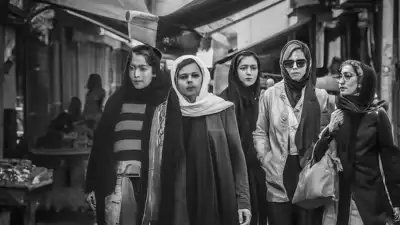
Representative Image (AI-generated)
"The state's current policy on the issue of the hijab is not to follow strict rules," Ali Motahari, a conservative Iranian politician, told journalists last week on the fringes of the International Book Fair in Tehran.He added that the police should only intervene in the event of gross violations."You have to know that even at the time of the Shah, before the 1979 revolution, women were arrested if they did not dress decently in public," he said. Wearing a hijab, or headscarf, remains mandatory in Iran.However, even before the nationwide protests following the death of Jina Mahsa Amini in police custody in September 2022, Motahari was one of those conservative politicians who repeatedly called for a crackdown on women who dared to deviate even slightly from the strict dress code.In 2014, he asked, "Why are women allowed to wear trousers under their coats?" He called on the authorities to take more rigorous action against the women concerned.
A changed country:
"What we have achieved in the last three years can no longer be taken away by the state," a gender researcher and journalist from Tehran told DW. She asked DW not to publish her name as the authorities regularly reprimand her for her stance, and she even receives death threats from anonymous callers.
She is one of the women who not only refuse to wear a headscarf in public, but also encourages other women to decide for themselves whether they want to."They can no longer force us to follow their rules and automatically wear a headscarf every time we leave the house," she says.She also emphasizes that Iran has changed after the death of Jina Mahsa Amini. For example, on 12 May, the coffin of Shiva Aristoui, an Iranian writer and poet, was carried by women without the mandatory hijab. Traditionally, carrying the coffin has long been a matter for men in accordance with religious and social norms. However, since the "Women, Life, Freedom" movement, more and more women attend funerals without the compulsory hijab and carry the coffins of their loved ones.Yet, many women deliberately stay away from international media and avoid public attention to continue on their path without additional repression. Any exchange with international media could be considered "propaganda against the system," "cooperation with a hostile government" or could be prosecuted as following an "order from abroad."Niloufar Hamedi, an award-winning journalist, is a recent example of the state's crackdown.
Her reporting on the death of Jina Mahsa Amini in 2022 brought her international fame.Among other pieces, she published a photo of Amini's grieving parents. It quickly went viral on social media and became a symbol of the nationwide protests, which became the largest protest movement in Iran since the Islamic Revolution in 1979.Hamedi was arrested and charged with alleged "collaboration with an enemy government," "propaganda against the system" among other charges. She was sentenced to a total of 13 years in prison. However, after 17 months, she was released on bail in January 2024. Iranian Supreme Leader Ayatollah Ali Khamenei then pardoned her and her colleague Elaheh Mohammadi in February 2025.On 11 May, 2,800 days after the report that changed the country, an article under her name appeared once more in the country's major daily Persian newspaper Shargh. Niloofar Hamedi is allowed to work as a journalist in Iran again.
The state lacks the power to stop change:
Does this indicate that the state has capitulated to women? "No," Sedigheh Vasmaghi, women's rights activist and theologian, told DW."The political system has not accepted the resistance the women have shown," she said.
"The state does not have the power to stop or even reverse this change either."Vasmaghi, who joined protesters against the compulsory headscarf rule, no longer wears a headscarf in public.In April 2023, Vasmaghi wrote an open letter to Khamenei in which she criticized his decree on the hijab requirement and emphasized that the Quran does not stipulate such an obligation.In March 2024, she was arrested for "propaganda against the system" and "public appearance without a Sharia-compliant hijab."
Due to her health problems, she was sent on parole.Still, she could be arrested again at any time. But she has no fear of that. "The state in Iran is facing massive domestic and foreign policy problems and is currently not in a position to deal with women across the country, especially teenagers and young women, who no longer want to wear headscarves," she told DW. "However, any measure that appears to be effective will be reviewed and attempted to be enforced," Vasmaghi continued, referring to the ongoing debate on the introduction of a controversial lawto monitor women in public in Iran. The law provides for a series of punitive measures for women who refuse to wear the required hijab in public."The political system can no longer turn back time," Vasmaghi said.

 3 weeks ago
81
3 weeks ago
81




























 English (US)
English (US)